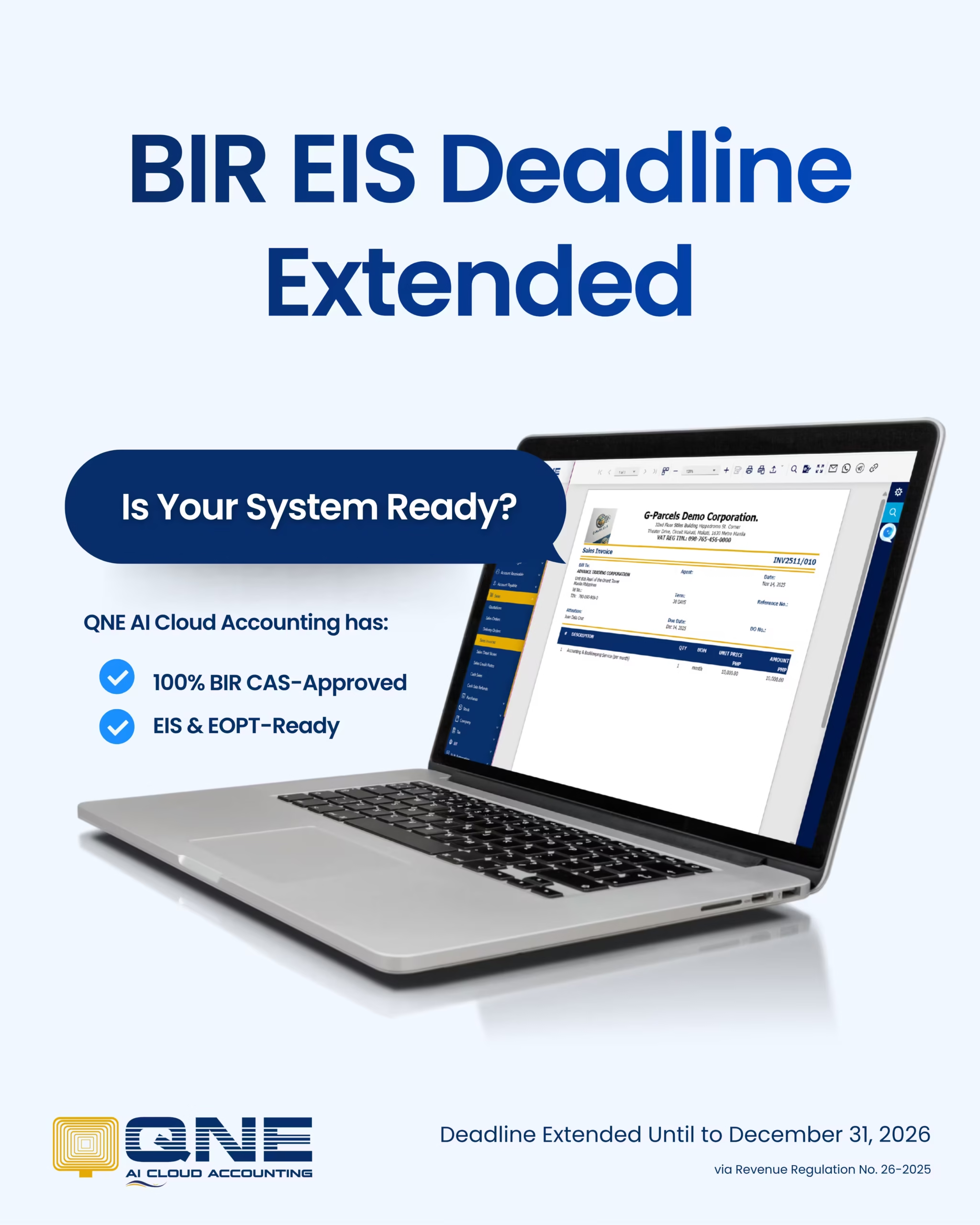Is Your System Ready for BIR Electronic Invoicing?
Get CAS-Registered and Penalty-Free
To support businesses in navigating the demands of digital transformation, the Bureau of Internal Revenue (BIR) has extended the compliance period for its Electronic Invoicing System (EIS). This update gives covered taxpayers additional time to comply with the requirements for issuing electronic invoices and receipts, an important development for accountants overseeing tax compliance and reporting.
If the transition to mandatory digital tax reporting feels complicated, it is often because the tools being used are not adequately tailored for the regulatory environment. Finding an accounting software capable of generating and issuing electronic invoices is the key to preparation. The proper implementation of electronic invoicing is crucial, and choosing the right tool makes the difference between burdensome compliance and streamlined operations.
BIR Extends the E-Invoice Deadline to December 31, 2026
Implemented through Revenue Regulation No. 26-2025, the e-invoice deadline has been moved substantially, shifting the compliance target from the initial target of March 2026 to December 31, 2026.
Read the full detailed explanation of the BIR’s e-invoice deadline extension here.
This extension acknowledges that the shift to a modern, digital tax administration requires careful planning and the deployment of a robust electronic invoice system. Former BIR Commissioner Romeo Lumagui Jr. explained that the primary objective is to grant businesses sufficient time (“sapat na oras”) to properly implement electronic invoicing. The Commissioner stressed the BIR’s desire to ensure that business systems are fully prepared (“handa ang kanilang mga systems”) before the system is fully enforced. The ultimate goal is to enable tax compliance that is faster, more accurate, and significantly more modern.
Utilizing the Extended E-Invoice Deadline for Preparation
Acknowledging the challenges faced by the private sector, Former Commissioner Lumagui stated that the transition process requires considerable time, budget, and careful implementation. By extending the e-invoice deadline, the BIR aims to provide taxpayers with adequate time for this transition (“sapat na panahon para sa transition”) without disrupting their regular business operations. Many businesses are actively engaged in upgrading or reconfiguring their existing accounting systems to align with the necessary e-invoicing standards.
While the Tax Code outlines penalties for noncompliance with tax regulations, the BIR is currently focused on providing education and guidance rather than immediate enforcement. The bureau has proactively issued clear and simple guidelines to help and assist businesses in reconfiguring their systems and successfully transitioning to BIR Electronic invoicing.
It is important to note that the Commissioner of Internal Revenue retains the authority to further extend the e-invoice deadline in the compliance period if deemed necessary, as stipulated in Section 3 of the Revenue Regulations. Nevertheless, businesses should prioritize utilizing this period to ensure readiness by the December 2026 date to align with the BIR Electronic invoicing mandate.
The Gateway to E-Invoicing: BIR CAS Registration
The successful implementation of electronic invoicing begins with the Computerized Accounting System (CAS). The BIR now mandates businesses in the Philippines to implement a CAS to ensure accurate, secure, and reliable tax audits.
Being CAS Registered is a pre-requisite for businesses intending to issue electronic invoices. By completing this step, businesses demonstrate their commitment to maintaining BIR standards, reinforcing their adherence to government regulations, and futureproofing the business.
A BIR CAS involves the integration of various component systems to generate computerized books of accounts, accounting records, and documents. CAS registration signifies readiness to comply with the BIR’s Electronic Invoice (E-invoice) requirements.
Understanding the BIR’s Electronic Invoicing
To ensure your system is compliant, it is vital to understand the BIR’s definition of an electronic invoice. Electronic invoicing refers to the automated process of generating structured invoice data which can be easily extracted electronically from the invoice, allowing for automated electronic data processing and exchange between a seller and a buyer.
Specifically, an electronic invoice is a written account evidencing the sale, exchange or transfer of goods, properties, services, and/or lease/use of properties, issued in the ordinary course of trade or business. This invoice must be generated using an accounting/electronic invoicing software or system with invoice management tools that is registered/accredited with the Bureau of Internal Revenue (BIR).
An electronic invoice is a system-generated invoice issued to the buyers electronically in a digital/electronic format, often via email as a Portable Document Format (PDF). A photo or scanned copy (in any file format) of a paper invoice (physical/manual copy) is not considered an electronic invoice. This highlights why a properly integrated, BIR-ready system is necessary for full compliance with the electronic invoicing mandate.
N3 AI Accounting (formerly QNE AI Cloud Accounting): The Suitable Electronic Invoice System for All Businesses
Compliance truly isn’t complicated when you choose the right tool. N3 AI Accounting (formerly QNE AI Cloud Accounting) is positioned as the right tool for businesses facing this transition because it simplifies complex regulatory steps and guarantees compliance readiness. It is more than just an accounting software, it’s a powerful, BIR CAS, Electronic Invoice business solution designed to cater to the needs of accounting, bookkeeping, and SMEs in the Philippines.
QNE Software is a BIR-Ready Computerized Accounting System that can handle various core processes, including BIR Forms and Reports Generation, General Ledger, Sales, Purchases, Accounts Receivable, Accounts Payable, Inventory, and other accounting processes.
A System Designed for the Filipino Taxpayer
N3 AI Accounting (formerly QNE AI Cloud Accounting) specifically caters to businesses operating under Philippine tax law through specialized features. With its user-friendly interface and localized features, N3 AI Accounting (formerly QNE AI Cloud Accounting) simplifies financial management while ensuring compliance with Philippine tax regulations.
Choosing QNE ensures your business remains future-ready with BIR CAS-Ready, EIS-Ready, and EOPT-Ready solutions, designed for smoother compliance and smarter operations. This comprehensive solution helps firms and businesses achieve efficiency and regulatory success by allowing them to:
- Streamline operations: Manage accounting, sales, and inventory within one unified system.
- Enhance decision-making: Gain real-time insights with intuitive financial reports.
- Improve efficiency: Automate transactions and significantly reduce manual work.
- Ensure BIR compliance: Stay updated with local tax laws and reporting requirements.
Proven Compliance: 100% BIR CAS Approval
The reliability of QNE in facilitating electronic invoicing compliance is underscored by its track record. QNE Software has 100% BIR CAS Approval, guaranteed as a testament to its commitment to compliance excellence.
This proven success applies across various sizes and types of businesses:
- Large Taxpayers (LTS): Twenty-four out of twenty-four Large Taxpayer Clients have been approved by the BIR, with no declined applications. QNE caters to large taxpayers in diverse industries such as real estate, e-commerce, manufacturing, and construction.
- SMEs: A computerized accounting system benefits small to medium enterprises by adapting a system that centralizes financial data and supports accuracy in generating forms and reports.
- PEZA-Certified Businesses: For businesses with specific tax needs, QNE ensures the system can handle the demand for customized forms for the BIR.
Overall, over 103 QNE Clients have had their Computerized Accounting Software certified by the BIR. This proven approval rate makes QNE a reliable partner for any business mandated to comply with the e-invoice deadline.

Making Compliance Smooth: QNE’s CAS Registration Process
One of the most immediate benefits of adopting a BIR CAS-ready solution like QNE is attaining CAS Registered status, which is the necessary gateway to electronic invoicing. Beyond achieving readiness for the EIS, being CAS registered provides two immediate organizational benefits:
- Centralized Financial Data: CAS registration ensures that your financial data is organized based on your specific requirements. This means there is “no need to panic when it’s time to generate BIR forms and reports when all the needed data is in one computerized accounting system”.
- Extension of Deadline for Reporting: A CAS registered organization gains a significant administrative advantage: the submission deadline for forms and reports is extended from the standard 15 days to 30 days.
QNE assists clients in making the CAS registration process quick and easy.
Here are the 3 Quick and Easy Steps to get CAS Registered with QNE
- Sign up: By providing your details, QNE Consultants can contact you and schedule a free demonstration showcasing how QNE can address your business requirements.
- Speak with QNE CAS Specialist: In this meeting, you discuss your specific BIR needs as a taxpayer. The specialist will demonstrate the modules available in QNE that help generate BIR forms and reports, computerized books of accounts, and computer-generated accounting records and documents.
- Submit BIR requirements: After completing the necessary forms for CAS registration, you return to QNE consultants to begin the onboarding of your new Computerized Accounting System
The BIR’s Digital Future: Electronic Invoicing and Beyond
The extension of the e-invoice deadline is a critical component of the BIR’s overarching digital transformation roadmap. The Electronic Invoicing System (EIS) is designed to work in tandem with the Electronic Sales Reporting System (ESRS).
The ESRS, which complements the EIS, is anticipated to become fully operational in the coming years. This system involves the electronic reporting or process of storing, transmitting, and/or receiving the electronic invoice data, through direct system-to-system data transfer without manual entry. This data transfer must be in a structured electronic format, such as JavaScript Object Notation (JSON) file format or Extensible Markup Language (XML), and not in PDF or image format.
The bureau’s grand vision, as highlighted by Former Commissioner Lumagui, is the full digitalization of all BIR operations by the year 2028. The successful implementation of the BIR Electronic invoicing system and the subsequent activation of the ESRS are vital steps toward achieving this modern tax administration environment.
Choosing QNE AI Cloud Accounting ensures that you are adopting a system that is not only ready for the current EIS mandate but is also positioned for compliance with future requirements like EOPT and ESRS, fulfilling the goal of smarter, future-proof operations.
How QNE Helps You Stay Future-Proof?
The extension of the e-invoice deadline to December 31, 2026, provides a valuable window for preparation. Businesses should utilize this time not just to react to the mandate but to strategically integrate a future-proof solution.
Compliance is a continuous journey, but it truly isn’t complicated when you choose the right tool, such as N3 AI Accounting (formerly QNE AI Cloud Accounting). By prioritizing the adoption of this reliable, BIR-certified CAS system now, businesses ensure they meet the prerequisite for electronic invoicing and are ready for the EIS and future requirements.
Choosing N3 AI Accounting (formerly QNE AI Cloud Accounting) means you are adopting a system that has guaranteed 100% BIR CAS Approval. This positions your business ahead of the curve, utilizing the maximum time granted by the extended e-invoice deadline to achieve smoother compliance and smarter operations. To understand how the CAS registration process benefits your firm immediately, particularly regarding reporting flexibility, please review The Immediate Perks of CAS Registration.
Stay government-compliant and future-ready. Unlock the power of AI for your business. Get CAS registered with QNE today!
Frequently Asked Questions (FAQs)
The BIR extended the e-invoice deadline to December 31, 2026 under RR No. 26-2025 to give businesses more time to upgrade their systems and comply smoothly.
A certified Electronic Invoice System ensures your invoices are valid under BIR rules and prevents penalties for non-compliance.
CAS registration is mandatory before issuing e-invoices and gives businesses extended deadlines and more organized financial reporting.
N3 AI Accounting (formerly QNE AI Cloud Accounting) has 100% BIR CAS approval and is fully equipped for EIS, EOPT, and future BIR digital requirements.
Preparing early avoids penalties, system delays, and rushed migrations as the BIR moves toward full digitalization by 2028.







